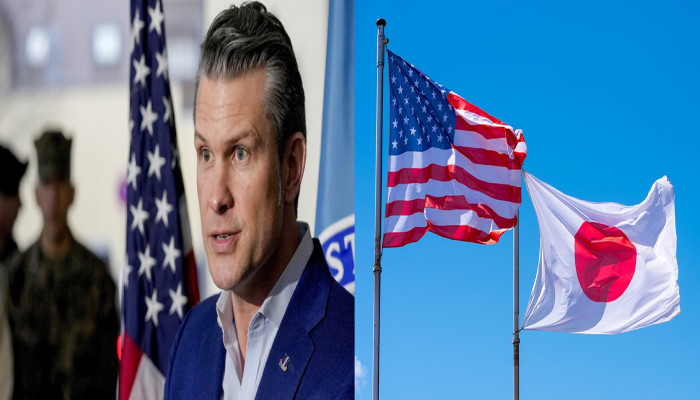US defence secretary calls Japan ‘indispensable partner’ amid rising Chinese threat
- In Reports
- 01:29 PM, Mar 31, 2025
- Myind Staff
On Sunday, U.S. Defense Secretary Pete Hegseth described Japan as an “indispensable partner” in countering China's increasing assertiveness in the region. He also announced that the U.S. military command in Japan will be upgraded to a new "war-fighting headquarters."
Hegseth, who is visiting Asia for the first time and has Japan as his second stop, emphasised the importance of both countries working together to strengthen their military forces more quickly. He highlighted this as necessary due to China's growing military actions in the region and the potential risk of a Taiwan crisis. At the start of his meeting with Japan's Defense Minister Gen. Nakatani in Tokyo, Hegseth declared, "Japan is our indispensable partner in deterring Communist Chinese military aggression. The US is moving fast, as you know, to reestablish deterrence in this region and around the world."
Japanese defense officials, speaking anonymously due to protocol, said his comments provided reassurance at a time when Japan is concerned about possible changes in U.S. engagement under President Donald Trump's "America First" policy. Trump's threat to impose trade tariffs on Japan, a key U.S. ally, has added to these concerns. Japan and the United States have agreed to speed up plans to develop and produce missiles together, including the Advanced Medium-Range Air-to-Air Missiles (MRAAM). They are also considering producing SM-6 surface-to-air missiles to help address the shortage of munitions, according to Nakatani. Additionally, both countries will work faster on arrangements for maintaining U.S. warships and warplanes in Japan, which will strengthen and support their defense industries.
In July, Japan and the U.S. decided to upgrade the command and control structure of their military forces in the country. This major change, introduced under the Biden administration, aims to improve joint operations and response capabilities. Japan currently hosts over 50,000 U.S. troops. Last week, Tokyo launched the Japan Joint Operations Command (JJOC) to improve coordination among its Ground, Maritime, and Air Self-Defense Forces. This move aims to strengthen Japan’s ability to respond to emergencies and work more closely with the U.S.
On Sunday, Hegseth announced that the U.S. will enhance its current command, US Forces Japan, by appointing a unified operational commander. This leader will serve as a direct link to Japan’s JJOC, creating a joint war-fighting headquarters to improve the speed and efficiency of their combined military operations. The Pentagon chief said the reorganisation of US troops is a step to better prepare for a possible conflict. "America and Japan both work for peace, but we must be prepared," he said.
Japanese defense officials have stated that they do not expect any major changes in their duties or an increase in the number of U.S. troops stationed in Japan. During a joint press conference, Hegseth and Nakatani emphasised the importance of strengthening Japan’s defense on the southwestern islands. These islands are strategically located near disputed areas in the East China Sea and close to Taiwan, making them crucial for deterring China. They also highlighted the need for a strong, well-prepared, and credible defense presence in the Indo-Pacific, including the Taiwan Strait. Since Japan is positioned at the frontline in the western Pacific, it must be ready to handle any potential conflicts in the region. China considers Taiwan a part of its territory. Meanwhile, a U.S. law from 1979 requires the country to supply Taiwan with enough military equipment and technology to prevent an invasion. However, U.S. arms sales to Taiwan have always faced strong opposition from China.
On Saturday, he attended a U.S.-Japan joint memorial to honour those who died in the Battle of Iwo Jima, marking 80 years since one of World War II’s most intense battles. During the event, he praised the strong alliance between the two nations, which were once enemies. Before arriving in Japan, Hegseth visited the Philippines, where he reaffirmed Trump’s commitment to strengthening ties with the country. The Philippines has ongoing maritime disputes with China.







Comments